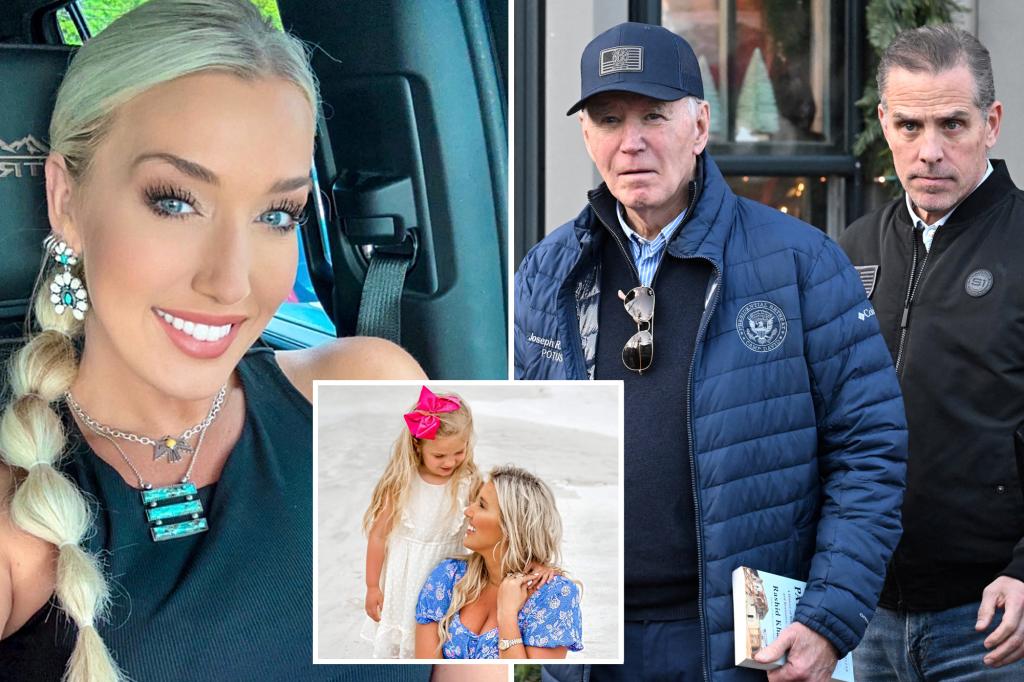The recent presidential pardon granted to Hunter Biden by his father, President Joe Biden, has sparked widespread debate and controversy. Amidst the political storm, Lunden Roberts, Hunter Biden’s former girlfriend and mother of his 6-year-old daughter, Navy Joan, has publicly voiced her support for the president’s decision. Roberts, in a statement released through her publisher, expressed her understanding of the president’s actions, framing them as the natural response of a loving parent. She believes that Hunter Biden has been unfairly targeted due to his familial connection to the president, suggesting that his actions, while legally questionable, are not unique and that others in similar situations have escaped legal consequences. Roberts further emphasized the double standard applied to Hunter Biden, arguing that his presidential lineage has subjected him to heightened scrutiny and harsher repercussions.
Roberts, drawing on her own experiences as a mother, underscores the profound lengths parents will go to for their children. She invokes a sense of unwavering maternal love, suggesting that any parent, regardless of their position, would act similarly to protect their offspring. This perspective humanizes the president’s decision, portraying it as an act of paternal love rather than a calculated political maneuver. While acknowledging her inability to fully grasp the complexities of presidential decision-making, Roberts firmly asserts that her maternal instincts would compel her to take any necessary action to safeguard her child’s well-being. This personal anecdote provides a poignant counterpoint to the political discourse surrounding the pardon, shifting the focus from legal technicalities to the deeply personal bonds of family.
While expressing support for the president’s decision to pardon his son, Roberts also expressed a desire for the same paternal affection to be extended to her daughter, Navy Joan. She longs for President Biden to embrace his role as a grandfather and actively participate in Navy Joan’s life. This yearning for familial connection exposes a vulnerability beneath the surface of the legal and political wrangling. Roberts’ plea is not merely for financial support or legal recognition; it is a heartfelt request for love, acceptance, and the building of a meaningful relationship between grandfather and granddaughter.
The backdrop of this complex situation is the tumultuous relationship between Hunter Biden and Lunden Roberts. Their encounter occurred in 2017 during a period when Hunter Biden was battling addiction. The subsequent paternity dispute surrounding Navy Joan was fraught with contention, culminating in a 2020 paternity test that definitively established Hunter Biden as the father. This legal battle added another layer of complexity to an already challenging situation, further highlighting the personal and familial struggles interwoven with the political narrative. The acrimonious history between Roberts and Hunter Biden underscores the delicate balance of family dynamics and the enduring impact of personal choices.
The ongoing child support dispute between Roberts and Hunter Biden, while legally resolved, further complicates the narrative. Roberts agreed to reduce monthly child support payments in exchange for Hunter Biden actively engaging in a relationship with Navy Joan. This arrangement, though seemingly amicable, reveals the ongoing negotiations and compromises required to navigate the complexities of co-parenting, especially when one parent is a public figure facing legal and political scrutiny. The agreement also highlights the importance Roberts places on fostering a genuine connection between her daughter and her father, prioritizing emotional bonds over financial considerations. The fact that their interaction is primarily conducted via Zoom further underscores the challenges they face in establishing a traditional parent-child relationship.
In essence, Lunden Roberts’ statement encapsulates a multifaceted perspective on the presidential pardon of Hunter Biden. It reflects a mother’s unwavering support for her child’s father, even amidst controversy, while simultaneously expressing a longing for the same love and acceptance to be extended to her own child. It highlights the complex interplay of familial love, legal battles, political maneuvering, and personal struggles, providing a human dimension to a story often dominated by headlines and political rhetoric. Roberts’ statement, while ostensibly about the pardon, transcends the purely political to become a poignant reflection on the enduring power of parental love and the enduring complexities of family relationships. It serves as a reminder that even amidst the tumultuous world of politics, deeply personal stories of family, love, and forgiveness continue to unfold.










